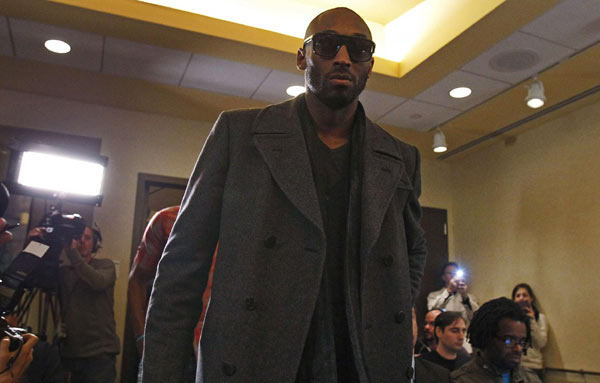Players reject offer, NBA season in jeopardy
Updated: 2011-11-15 09:20
(Agencies)
|
|||||||||
 |
|
Los Angeles Lakers Kobe Bryant arrives for a news conference announcing the players rejection of the league's latest offer on Monday and the process to begin disbandand the union in New York, Nov 14, 2011. [Photo/Agencies] |
'Continued threats'
Stern said the NBA prepared for the union's latest move.
"In anticipation of this day, the NBA filed an unfair labor practice charge before the National Labor Relations Board asserting that, by virtue of its continued threats, the union was not bargaining in good faith," Stern said.
"We also began a litigation in federal court in anticipation of this same bargaining tactic."
The last abbreviated NBA season was in 1998-99 when a six-month dispute reduced the campaign by 32 games to 50 and forced the cancellation of the All-Star Game.
That year, Stern said he would recommend scrubbing the season if there was no deal by Jan 7. The day before that deadline, Hunter and Stern agreed to terms of a deal, and the season began in early February.
"We have negotiated in good faith for over two years and we've done everything anybody could reasonably expect of us particularly when you look at the number of give-backs and concessions," said Hunter.
"But the players just felt that they have given enough, that the NBA was not willing or prepared to continue to negotiate. Things were not going to get better and they were going to continue to reach and grab."
Stern had told the players that if they did not accept the latest owners' proposal, that their next offer would be rolled back to 47 percent of the pie for the players.
"There were some owners, not the majority, who felt our offer had gone too far in favor of the players," Stern told ESPN. "But I was confident I could use my powers of persuasion to navigate through to an approval if the union said yes.
"But that's really academic now, because it looks like the 2011-12 NBA season is really in jeopardy."
While a legal battle could drag on, a quicker solution is more likely, according to one sports law expert.
"There can be an expedited legal progress that gives us a decision from a court within a matter of weeks," Gabe Feldman, Director, Sports Law Program, at Tulane University Law School, said in a telephone interview from New Orleans.
"For the case to play itself all the way out from complaint to antitrust litigation, could possibly take years ... I just don't foresee that happening. It is more likely that whoever wins the initial legal battle is going to have more leverage, and that could lead to a settlement."











